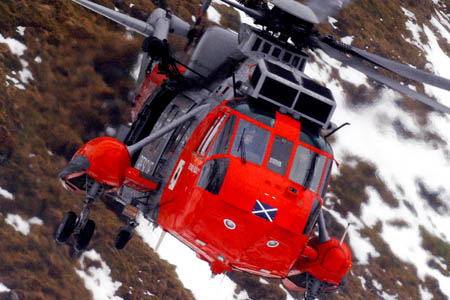The number of rescue missions carried out by the RAF and Royal Navy search and rescue teams in the first six months of 2011 was the lowest for six years.
Figures released today by Defence Analytical Services and Advice for the Ministry of Defence show there were 870 callouts between January and June, 118 fewer than the same period last year.
The statistics include flights by the Sea King helicopters from eight bases around Britain, along with missions undertaken by the four RAF mountain rescue teams.
Although the primary purpose of the military search and rescue teams is to help aircrew in difficulty, a large proportion of their work is in civilian rescues of climbers and walkers on the UK’s mountains, hills and cliffs. About half the Royal Navy’s missions from HMS Gannet in Ayrshire are mountain rescues.
The six-month figure was the lowest since 2005. A total of 701 people were ‘moved’ by RAF and Royal Navy teams and crews – defined as transporting from a hostile to a safe environment or medical facility. It also includes emergency transfers of casualties between hospitals.
The figures do not include the missions flown by the Maritime and Coastguard Agency’s helicopters based at Stornoway on Lewis, Sumburgh in Shetland, Portland and Lee-on-the-Solent. The Shetland and Stornoway bases operate Sikorsky S92 helicopters, and the Lee-on-the-Solent and Portland bases operate AgustaWestland AW139s. The Portland helicopter operates for 12 hours each day.
The entire search and rescue helicopter operation was due to be privatised under a £7bn contract until irregularities were found in the bidding process of the successful consortium Soteria.
Transport Secretary Philip Hammond said a short-term contract for up to five years will be sought for the Coastguard aircraft, and that the military Sea Kings would be withdrawn from service in 2016.
All military search and rescue flights are carried out under the control of the Aeronautical Rescue Co-ordination Centre at RAF Kinloss in Moray, which has been earmarked for closure by Defence Secretary Liam Fox.

Jude Bland
28 July 2011If this service is privatised, how will our raf helicopter pilots get the necessary experience? " Transporting from a hostile to a safe environment or medical facility" is somewhat of a necessity in both wartime and in peacetime emergencies. It seems ludicrous to privatise these services only to have to "buy" training later.
Dave Simpson
30 July 2011Jude
It simply doesn't work like that. Initial training is carried out by all aircrew as they enter the "UK SAR service", whether they fly for the RAF, RN or HMCG (CHC). They all then do regular monthly training to keep up their expertise and licensing currency in addition to any rescue missions they may fly.
Military crews have to be trained at several levels both to fly the aircraft type and training in the role such as mountain rescue techniques, and civilian crews do likewise. Invariably the latter achieve the same standard at cheaper cost for a variety of reasons.
A fully civilianised UK SAR service is more than capable of both training its crews and delivering the full operational standard required but at a cheaper cost to the taxpayer. Indeed better value for money is also achieved as such civilian crews on average spend much longer dedicated to the SAR role, whereas military crews after a few years are often sent of to other military roles like those flown in Afghanistan. This is just one of the added costs of maintaining a military manned system.